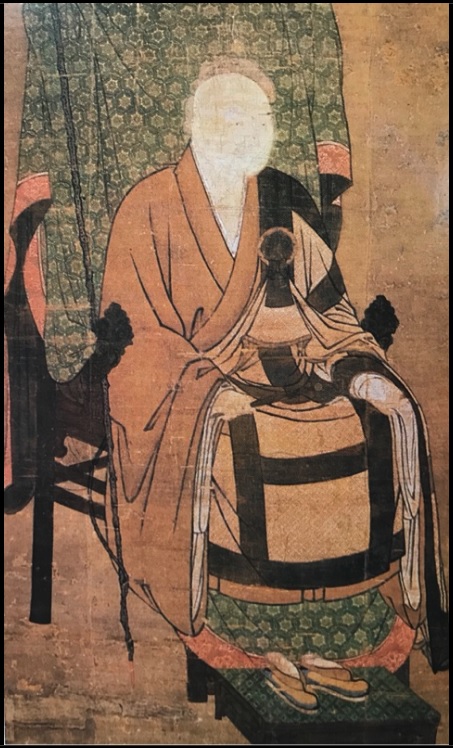ZEN MESTEREK ZEN MASTERS
« Zen főoldal
« vissza a Terebess Online nyitólapjára
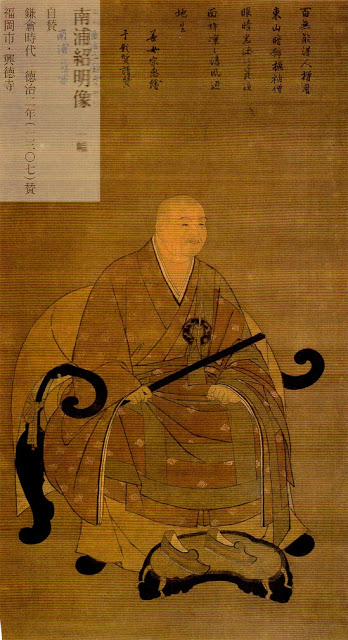
南浦紹明 Nanpo Jōmyō (1235–1308)
posthumous name Enzu Daiō Kokushi 圓通大應國師
usually simply Daiō Kokushi 大應國師
Nampo Jomyo was another who traveled to China to deepen his understanding of Zen.
He was the nephew of Enni Ben’nen and became a monk at the age of 15. Three years later, at 18, he sought out the Chinese master Rankei Doryu [Lanxi Daolong] who had come to Japan to establish Kenchoji as a Rinzai temple in Kamakura. After a time with Rankei, Jomyo went to China to continue studying with Kido Chigu [Xutang Zhiyu], Rankei’s Dharma brother.
In 1265, Jomyo achieved enlightenment and was recognized as an heir by Kido. Kido was so impressed by the young Japanese’s attainment that when the time came for him to return to his home country, Kido wrote this valedictory poem predicting the success he would find in Japan:
To knock on the door and search with care,
To walk broad streets and search the more:
Old [Kido] taught so clear and bright,
And many are the grandchildren on the eastern sea who received [this teaching].(Dumoulin, Heinrich. Zen Buddhism: A History – Japan, p. 39.)
Upon his return to Japan, Jomyo spent some time with his former teacher, Rankei, before moving to the southern island of Kyushu, where he was appointed abbot of Kotokuji and later of Sofukuji, where he taught for thirty years.
In 1304 he was invited to Kyoto by the retired Emperor, Go-Uda in order to become the abbot of Kagenji; however, the continued enmity of the Tendai hierarchy to the incursions of Zen temples into their city prevented him from staying.
His final temple was Kenchoji in Kamakura. At his investiture ceremony, he is said to have proclaimed, “My coming today is coming from no where. One year hence, my departing will be departing to no where.”
Just as he predicted, one year to the day he died. The death poem he left behind reads:
I rebuke the wind and revile the rain,
I do not know the Buddha and patriarchs;
My single activity turns in the twinkling of an eye,
Swifter even than a lightning flash.(Miura and Sasaki, Zen Dust, p. 206.)
Died on the twenty-ninth day of the twelfth month, 1309 at the age of seventy-fourIn 1307, exactly a year before his death, Nampo wrote:
This year, the twenty- ninth of the twelfth
No longer has a place to come to.The twenty- ninth of the twelfth next year
Already has no place to go.These words were taken, after his death, as proof that Nampo knew he would die in a year. And so it was: on the twenty- ninth day of the twelfth month, 1308, Nampo took up his brush, wrote the following poem, and died.
To hell with the wind!
Confound the rain!
I recognize no Buddha.
A blow like the stroke of lightning--
A world turns on its hinge.(Yoel Hoffmann, Japanese Death Poems)
Like Bukko, Jomyo was given a posthumous name, Daio, and the title, National Teacher. The most vigorous line of the Japanese Rinzai School would proceed from the Dharma descendents of Daio Kokushi.
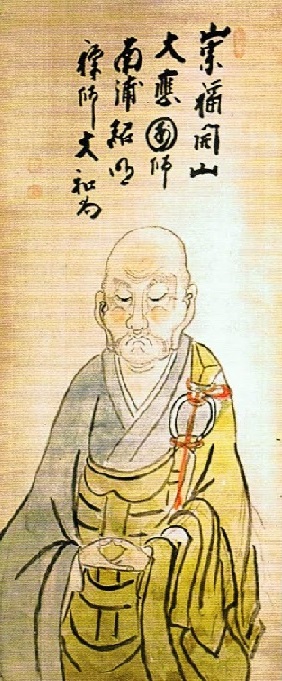
南浦紹明 Nanpo Jōmyō (大應國師 Daiō Kokushi, 1235–1308), painted by Hakuin
DAI-O KOKUSHI "ON ZEN"
Translated by D. T. Suzuki
(Manual of Zen Buddhism, 1935, p. 145)
There is a reality even prior to heaven and earth;
Indeed, it has no form, much less a name;
Eyes fail to see it; It has no voice for ears to detect;
To call it Mind or Buddha violates its nature,
For it then becomes like a visionary flower in the air;
It is not Mind, nor Buddha;
Absolutely quiet, and yet illuminating in a mysterious way,
It allows itself to be perceived only by the clear-eyed.
It is Dharma truly beyond form and sound;
It is Tao having nothing to do with words.
Wishing to entice the blind,
The Buddha has playfully let words escape his golden mouth;
Heaven and earth are ever since filled with entangling briars.
O my good worthy friends gathered here,
If you desire to listen to the thunderous voice of the Dharma,
Exhaust your words, empty your thoughts,
For then you may come to recognize this One Essence.
Says Hui the Brother, "The Buddha's Dharma
Is not to be given up to mere human sentiments."
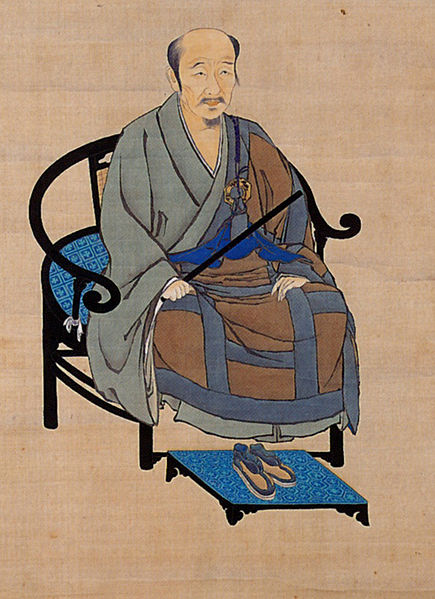
Nampo Jōmyō's Dharma Lineage
[...]
菩提達磨 Bodhidharma, Putidamo (Bodaidaruma ?-532/5)
大祖慧可 Dazu Huike (Taiso Eka 487-593)
鑑智僧璨 Jianzhi Sengcan (Kanchi Sōsan ?-606)
大毉道信 Dayi Daoxin (Daii Dōshin 580-651)
大滿弘忍 Daman Hongren (Daiman Kōnin 601-674)
大鑑慧能 Dajian Huineng (Daikan Enō 638-713)
南嶽懷讓 Nanyue Huairang (Nangaku Ejō 677-744)
馬祖道一 Mazu Daoyi (Baso Dōitsu 709-788)
百丈懷海 Baizhang Huaihai (Hyakujō Ekai 750-814)
黃蘗希運 Huangbo Xiyun (Ōbaku Kiun ?-850)
臨濟義玄 Linji Yixuan (Rinzai Gigen ?-866)
興化存獎 Xinghua Cunjiang (Kōke Zonshō 830-888)
南院慧顒 Nanyuan Huiyong (Nan'in Egyō ?-952)
風穴延沼 Fengxue Yanzhao (Fuketsu Enshō 896-973)
首山省念 Shoushan Shengnian (Shuzan Shōnen 926-993)
汾陽善昭 Fenyang Shanzhao (Fun'yo Zenshō 947-1024)
石霜/慈明 楚圓 Shishuang/Ciming Chuyuan (Sekisō/Jimei Soen 986-1039)
楊岐方會 Yangqi Fanghui (Yōgi Hōe 992-1049)
白雲守端 Baiyun Shouduan (Hakuun Shutan 1025-1072)
五祖法演 Wuzu Fayan (Goso Hōen 1024-1104)
圜悟克勤 Yuanwu Keqin (Engo Kokugon 1063-1135)
虎丘紹隆 Huqiu Shaolong (Kukyū Jōryū 1077-1136)
應庵曇華 Yingan Tanhua (Ōan Donge 1103-1163)
密庵咸傑 Mian Xianjie (Mittan Kanketsu 1118-1186)
松源崇岳 Songyuan Chongyue (Shōgen Sūgaku 1132-1202)
運庵普巖 Yunan Puyan (Un'an Fugan 1156–1226)
虛堂智愚 Xutang Zhiyu (Kidō Chigu 1185–1269)
南浦紹明 Nampo Jōmyō (1235-1308) [大應國師 Daiō Kokushi]
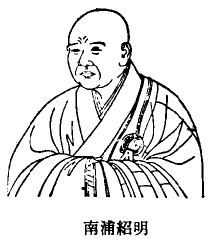
Sayings of National Teacher Daio at Kofuku Zen Temple
National Teacher Daio's Letters to Meditators
Praises of Kannon by Daio
Translated by Thomas F. Cleary
In: The Original Face: An Anthology of Rinzai Zen, Grove Press, 1978. pp. 59-74.
Sayings of National Teacher Daio at Kofuku Zen Temple
Informal Talk at the Beginning of Winter
Address in the Teaching Hall
Informal Talk on New Year's Eve
Address in the Teaching Hall on the First Night of the New Year
Address in the Teaching Hall on the Anniversary of Buddha's Demise
Address in the Teaching Hall on the First Day of March
Address in the Teaching Hall
Address on the Anniversary of Buddha's Mahaparinirvana• Informal Talk at the Beginning of Winter
Everything is the original law; every day the morn-
ing sun clears the sky, in every mind there is no
separate mind, in every place the pure wind circles the
earth. If you can understand immediately in this way,
then there is no need for Shakyamuni to appear in the
world or for Bodhidharma to come from the west-
in everyone it towers like a mile-high wall, flashing a
great precious light in everyone's presence. One
thought ten thousand years, ten thousand years one
thought, eating when hungry, sleeping when tired, who
worries about the alternation of light and dark, the
change of seasons? Who talks about ice forming from
each drop of water, who says when the weather is cold
the people are cold? Even if you go on this way, this is
still ordinary behavior; how can ultimate transcendence
be revealed? [hitting with his whisk] If winter isn't cold,
wait and see after the twelfth month.An ancient worthy said, "If you want to know the
meaning of enlightened nature, you must watch the
causal relations of time and season; when the time has
arrived, the truth is manifest of itself." Now it is the
beginning of the winter season; tell me, what is the truth
that is revealed? [striking with his whisk] When one sun
rises, myriad species are born.
• Address in the Teaching Hall
A monk asked Joshu, "What is the path?"
Joshu said, "The one beyond the fence."
The monk said, "I'm not asking about that path."
Joshu said, "What path are you asking about?"
The monk said, "The great path."
Joshu said, "The great path goes to the capital."
Daio said in verse: "He points it out so clearly, face
to face without deception; the great path is straight as a
bowstring, but travelers make trouble for themselves."
• Informal Talk on New Year's Eve
Hanging high the jewel mirror, ranging myriad
images before the eyes, holding the sharp sword
sideways, cutting off all impulses beyond conception,
covering heaven and earth, passing through form and
sound, shutting down and opening up at will, killing
and giving life according to the occasion, in full
command of holding fast or letting go. This is whereby
patch-robed monks explain what cannot be practiced
and practice what cannot be explained, changing in
thousands of ways freely-even disrupting the order of
time and wiping out the elemental spirits is not beyond
their capability. But even so, tonight I forgo the first
move; when the twelfth month is over, as of old, it is up
to spring to return. Why? I want you people to take care
at all times.
• Address in the Teaching Hall on the
First Night of the New Year[describing a circle in the air with his whisk]
Lighting this lamp, all lamps immediately shine; the
dense web of myriad shapes and forms has nowhere to
hide. If under an overturned bowl, how can you blame
me? [a long silence] But tell me: what lamp is it?
• Address in the Teaching Hall on the
Anniversary of Buddha's DemiseThe single heart not dwelling in extinction point-
lessly sells off the golden body; up till now the ugliness
has been impossible to conceal-what a mess, every
year, the peach-blossom spring.
• Address in the Teaching Hall on the
First Day of MarchSpeaking of Zen, expounding the way, talking about
marvel and mystery, is all gouging wounds in healthy
flesh. Ultimately, what? "I always remember southern
China in the spring, the fragrance of the hundred
flowers as the partridges cry."
• Address in the Teaching Hall
Great Master Ummon said to his group, "Monks,
don't think falsely; mountains are mountains, rivers are
rivers."Then a monk came forward and said, "How is it
when I see that mountains are mountains and rivers are
rivers?"Ummon said, "Why is the Buddha shrine passing
through here?"The monk said, "Then I am not thinking falsely."
Ummon said, "Give me back the words."
[citing this, Daio said] So then what is easy to open
is the beginning and ending mouth; what is difficult to
maintain is the heart of the dead of winter. When that
monk heard Ummon say, "Why is the Buddha shrine
passing through here?" if he had just said, "It should be
so," he would not only have shown his own light, he
would have also seen through Ummon's standpoint.
• Address on the Anniversary of
Buddha's MahaparinirvanaThe Buddha body fills the cosmos, manifest to all
sentient beings everywhere. [raising his whisk] This a
whisk; where is the Buddha body? People, if you can set
a single eye here, you will see the solemn assembly on
Spiritual Mountain has not yet dispersed, but if you
hesitate and doubt, the ancient Buddha is long gone.
National Teacher Daio's Letters to Meditators
To Zen Man Gentei
To Kyoen, Latter Abbot of Manju Monastery
To Nun Gentai
To Bath Steward Genan
To Zen Man Kusho
To Zen Man Genchu• To Zen Man Gentei
The World Honored One raised a flower, Kasyapa
smiled-gold is not exchanged for gold, water does not
wash water; since then it has come down from genera-
tion to generation, taking in an echo from empty space,
one person communicating it to one other . Hence we
see Zen teachers doing things like going east to west,
west to east, Hoshan beating a drum, Bimo raising his
forked stick, Xuefeng rolling balls, [udi raising his
finger, three pounds of hemp, the cypress tree in the
garden, and myriad other illustrations, hundreds of
thousands of actions using it, all coming forth in the
same pattern, strung through on one thread. If one is a
genuine patch-robed monk, who would care whose
ladle handle was long or short? If you don't dump the
gourd, the vinegar becomes sharper and sharper. Just go
by your own sight; live on your own. Eminent Gentei
quickly set your eyes to see before the W orld Honored
One raised the flower; keep watching whatever you do
until this work becomes pure and refined to the point
where in one moment you merge and see the original
face, the scenery of the original ground. At that time
tawny old Buddha and the golden ascetic Kasyapa wili
both stand downwind of you. That is why it is said that
a powerful man is the ancestor of mind before heaven
and earth. Think of this, eminent Tei, think of this.
• To Kyoen, Latter Abbot of Manju Monastery
When Rinzai left Obaku long ago, Obaku said,
"Where are you going?" Rinzai said, "If not south of the
river, then north of the river." Obaku then hit him.
Rinzai grabbed the staff and slapped him. Obaku
laughed loudly, called his attendant, and said, "Bring
me the meditation brace and whisk of my late master
Hyakujo."Rinzai called to the attendant, "Bring me fire." After
all, a good son doesn't use his father's money.Obaku said, "Just take them away; later you will cut
off the tongue of everyone on earth." This old fellow
cared so for his child that he did not mind being
unseemly.Eminent Kyoen has been with us on this mountain
for four years, and his determination and mindfulness
in investigation of the way are solid and firm; in his
daily actions he is never off balance. Now he is going to
another mountain and has come to take leave of us.
Though the eminent has the ability to ask for fire, I have
no meditation brace or whisk to hand over. But tell me:
is this the same as the ancients or different? If you
should encounter someone at a crossroads in a village of
three families, don't misquote this.
• To Nun Gentai
Sister Gentai, from the capital. Her determination in
seeking the way is keen, and she often comes to inquire
further into the basis and conditions of this great
matter. One day I said to her, "At the top of the
hundred-foot pole, go forward."She said, "At the top of the hundred-foot pole, there
is no place to go."I said, "Where there is no place to step, go a
hundred thousand steps farther-only then will you be
able to walk alone in the red skies, pervading the
universe as your whole body." She agreed and smiled;
that's all. Although she has not yet gotten the gist of it,
she is not the same as ordinary folk who get stuck on
even ground.Now you want to return to your old capital and have
come with incense in your sleeve to ask for a saying . I
once made a verse of praise on the master of Ikusan in
Daryo,* so I will write that:Atop the pole, walk on by the ordinary route -
It is most painful, when taking a tumble in a valley
Earth, mountains, and rivers cannot hold you up
And space suppresses laughter, filling a donkey's cheeksI ask you, Zen nun, to bring this up and look at it time
and again; how to go forward from atop the pole?
Suddenly, when the time comes, you can go forward a
step, and space will surely swallow a laugh. Remember,
remember.*The master of Ikusan worked on a koan - "How to proceed
forward from atop the hundred-foot pole? Uh!" - for three years,
when one day, as he was crossing a valley stream on a donkey, the
bridge plank broke and he fell, whereupon he was greatly en-
lightened. Atop the pole means at the peak of meditation, or
personal detachment and liberation, or it can be used to refer to the
farthest point of any aspect of work on the way. It usually refers,
however, to the esoteric death, after which the "step forward,"
return to life, at one with the world, is the beginning of the next,
usually more difficult, phase of Zen study.
• To Bath Steward Genan
The peak experience, the final act; as soon as you try
to pursue it in thought, there are white clouds for a
thousand miles . But even if you go back upon seeing
the monastery flagpole at a distance, or head off freely
upon seeing a beckoning hand, this is still only half the
issue; it is not yet the strategic action of the whole
capability.Bath steward An has traveled and studied various
places and spent a long time in monasteries. Don't stick
to the ruts in the road of the ancients-you must travel a
living road on your own . East, west, foot up, foot down,
using it directly-only then will you know the peak
experience illumines the heavens and covers the earth,
illumines the past and flashes through the present. This
is your own place to settle and live. When I say this, I
am only using water to offer flowers, never adding
anything extra. This of this, eminent, think of this.
• To Zen Man Kusho
The cause and conditions of the one great concern of
the enlightened ones is not apart from your daily affairs;
there is no difference between here and there-it
pervades past and present, shining through the heavens
mirroring the earth. That is why it is said that every-
thing in the last myriad eons is right in the present. We
value the great spirit of a hero only in those concerned-
before any signs become distinct, before any illustration
is evident, concentrate fiercely, looking, looking, com-
ing or going, till your effort is completely ripe and in the
moment of a thought you attain union, the mind of
birth and death is destroyed and suddenly you clearly
see your original appearance, the scene of your native
land; each particular distinctly clear, you then see and
hear just as the buddhas did, know and act as the
enlightened ancestors did. Only then do you really
manage to avoid defeat in your original purpose of
leaving home and society and traveling for knowledge
and enlightenment. Zen man Kusho, work on this.
• To Zen Man Genchu
Since ancient times, the enlightened ancestors ap-
pearing in the world relied just on their own fundamen-
tal experience to reveal something of what is before us;
so we see them knocking chairs and raising whisks,
hitting the ground and brandishing sticks, beating a
drum or rolling balls, hauling dirt and stones-"A ten-
ton catapult is not shot at a rat."Even though this is so, eminent Genchu, you have
traveled all over and spent a long time in monasteries;
don't worry about such old calendar days as these I
mentioned-just go by the living road you see on your
own; going east, going west, like a hawk sailing through
the skies. In the blink of an eye you cross over to the
other side.If you are not yet capable of this, then look directly
at before the enlightened ones were present, before the
world was differentiated; twenty-four hours a day,
walking, standing, sitting, reclining, carefully, continu-
ously, closely, minutely, look, look, all the time. When
this directed effort becomes fully developed and pure,
suddenly in an instant you are united, the routine mind
is shattered and you see the fundamental countenance,
the scenery of the basic ground. Everything will be
distinctly clear; it is as if ten suns were shining. When
you get to this state, you should be even more careful
and thorough going. Why? At the last word you finally
reach the impenetrable barrier.Eminent Genchu has been with our group for a
summer and suddenly wants to go to another mountain.
Just before leaving, he asked for some words, so I wrote
this, letting the pen write what it would, to fulfill his
request.
Praises of Kannon by Daio
the sphere of perfect communion is clear everywhere
the pitcher water is alive, the willow eyes are green
there are also cold crags and early green bamboo
why are people these days in such a great hurry?the cliffs are high and deep, the waters rush and tumble
the realm of perfect communion is new in each place
face to face, the people who meet her don't recognize her
when will they ever be free from the harbor of illusion?lotus blossoms always in her hands, she stands alone magnificent
a boy comes to call
wordless, eyes resemble eyebrows
know that outside of joining the palms and bowing the head
how could this thing be explained to him?the sound of the rushing spring is cool and subtle
the colors of the mountain crags are deep but distinct
in every field the realm of perfect communion
how can Sudhana know?the dense crags jut forth precipitous
the waterfalls spew an azure loom
in each land the sphere of perfect communion
those who go right in are rarethe clouds are thin, the river endless
the universal door appears without deception
questioning the boy, he doesn't yet know it exists
he went uselessly searching in the cold of the mist and waves
in a hundred cities
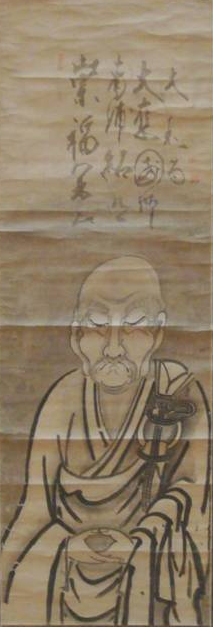
南浦紹明 Nanpo Jōmyō (大應國師 Daiō Kokushi, 1235–1308), painted by Hakuin
![]()
Daio Kokushi zenről szóló verse
Fordította: Varga Imre
(Zen Benedek, Budapest, Kortárs Kiadó, 62-63. oldal)
A végső valóság égnél, földnél elébb való
Formája, sőt neve sincsen.
Nem látja szem, nem hallja fül.
Szellemnek vagy Buddhának nevezni sem az ő természete.
A név, akár ha művirág lenne csupán.
Nem szellem, nem Buddha ő,
tökéletes nyugalma sugárzik.
Csak a tiszta szem láthatja meg.
Ő a hangon és formán túli törvény.
Ő az út, s nem illetheti szó.
Buddha játékos szavait hallani nem-látók
gyűltek körébe. Azóta eget-földet ellep
a burjánzó tüskés bozót.
Nagytiszteletű és kedves barátaim, akik itt egybegyűltetek,
ha a dharma mennydörgő hangját
szeretnétek hallani,
a szavakat engedjétek el,
a tudat váljék üressé,
s ekkor megtapasztalhatjátok az egyetlen valót.
[…]
Dai-o (1235–1308): Intelmek
translated into English by D.T.Suzuki (1870–1966)
Fordította: Komár Lajos
Ki a Tan kapuján belép, első dolga legyen kifejleszteni alázatos és tisztelet-
tudó módon a szerzetességbe vetett szilárd elhatározást, amely a kivezető
ösvény a hatalmaskodás és megalázkodás tévútjairól.
Legyen alázatos, ahogy a három világ Tankirályának (Dharmaraja) fia
viselkedik; ez nem az a hercegi alázat, ahogy nemes urak előtt megaláz-
kodunk. Legyen tisztelettudó, ahogy minden érző lény atyjával teszik; ez
nem csupán a családfőt megillető tiszteletadás. Amikor a szerzetes kellő-
en alázatos és tisztelettudó, a Tan barlangjában él, a gyakorlás mámorában
tölti napjait, és a Három Kincs védőistenségeinek oltalmát élvezi, kíván-
hat-e ennél többet?
A borotvált fej és a színezett köntös a tökélyharcos jelképei; a templomi
építkezések pedig, minden más jelképpel egyetemben, a nemes buddhista
szándék kifejezései. Ezeknek semmi közük a cicomához és pompához.
Az a szerzetes, aki ily módon tisztelettudóan és tiszteletreméltóan vi-
selkedik, követői mindenfajta felajánlásaira érdemes; minden figyelmét a
Tanra szentelheti, anélkül hogy világi feladatokra fecsérelné idejét – elmé-
jét valóban a Buddhákhoz és az Atyákhoz fordítva. Amennyiben a szerze-
tes ilyen életforma mellett sem képes átkelni a születés-halál hömpölygő
folyamán, akkor ugyan mikor hálálja meg az ősök szerető gondoskodását?
Bármikor elszalaszthatjuk a szerencsénket; ezért a szerzetes mindig álljon
készen, ne henyéljen!
A Buddhák és az Ősatyák által jelzett ösvény a tanátadás ősi, rejtélyes
útja, mely felvezet a Hegyre; ezen az úton haladni egyben a tiszteletünk és
hálánk jele is. Amennyiben a szerzetes nem képes fegyelmezni magát az
úton, úgy elkülönül a tisztelettudó és tiszteletreméltó társaitól; egy szeren-
csétlen nyomorult lesz csupán. Öregségemre csupán ennyi bánkódnivaló
jutott; és Ó, szerzetesek, ez ügyben fáradságot nem kímélve segítettem
mindannyitokat, a nap bármely szakában. Így, távozásom közeledtével is,
együtt érzek veletek, és imádkozom, hogy a tisztelettudó és tiszteletreméltó
szerzetesi erényekben sosem szűkölködjetek, és azokhoz mindig méltó
módon létezzetek. Imádkozzatok, és ezeket jól véssétek eszetekbe!
Dai-o: A Zen
Valóság, nem földi, sem mennyei,
nincs alakja, sem neve,
szem nem látja, fül nem hallja,
a „Tudat” vagy „Buddha” nevek sértik természetét,
látomás, mint virág az űrben,
nem Tudat, sem Buddha,
csendes, fénylő ragyogás,
kinek nem fedi por szemét, látja csak.
Tan, nem látvány, sem hang,
Ösvény, szavak nélkül.
Hogy a vakok is lássák,
a Magasztos kinyilatkozott, s mára
mennyről s pokolról zagyva beszéd lett csupán.
Barátok, kik itt összegyűltetek
a Tan mennydörgő hangjára vágyva,
mikor nincs szó, sem gondolat,
felismeritek az Egy lényegét.
A Magasztos Tana ez, mely
minden lény üdvére van.
